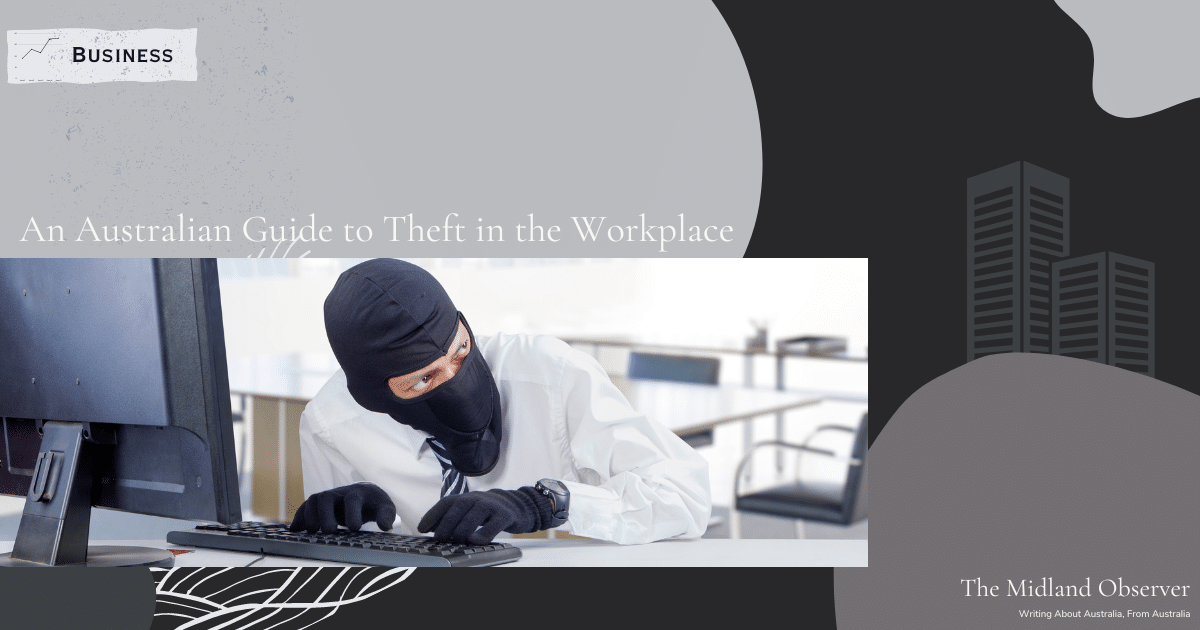Theft in the workplace is a serious issue, and it’s one that often goes unreported. Whether it’s by customers, burglars, or simply employees, theft is a surprisingly common issue that businesses of all kinds have had to find ways to combat. If you’re an Australian or business owner, then you need to be aware of the risks of theft in your workplace. Throughout this article, we’ll guide you through some of the most common types of theft in the workplace, and how to avoid them.
Theft in the Workplace and Its Prevalence in Australia
This is an unfortunately common occurrence in many businesses across Australia and the world. It often takes the form of employees stealing materials and assets, as well as misusing their position for financial gain.
Theft can range from a few dollars to much larger sums, and this has significant consequences for both companies and employees involved. Not only does it impact morale, but it can also lead to a decrease in productivity, compromise the security of company data or proprietary information, and damage corporate reputations beyond repair.
It is important for businesses to take theft seriously and develop strategies for protection accordingly.
Why Employee Theft Needs to Be Addressed
While employee theft has a damaging effect on the bottom line of large and small businesses, there are much larger issues at play that affect the overall structure of society. When employees steal, it erodes trust, confidence and loyalty between employers and employees. It also harms colleagues who are seen as inherently honest and may lead to an increase in insurance premiums for the company.
Addressing employee theft is therefore essential in any business setting to solidify positive and ethical behaviour at all levels of the business hierarchy. By taking the right steps and implementing clear policies it is possible to reduce workplace theft significantly and create an atmosphere of trust and respect between employers and their employees.
Reasons Why Employees Steal From Their Workplace
Employees steal from their workplace for a variety of reasons, some of which may be economic or psychological. Feeling underpaid, undervalued, and unrecognised by their employer can lead an employee to believe stealing is justified. Additionally, financial struggles due to the rising costs of living in urban areas can drive some to seek extra income through theft.
In some cases, an employee’s misguided sense of loyalty to a group or cause may also lead them to feel that stealing is acceptable. Aside from these theoretical motivations, simple opportunity and convenience can prompt an employee to take advantage of situations where they have access to valuable items or resources.
Ensure to Encourage Employees to Report Any Suspicious Behaviour to Management
If a company wants to be successful and reduce the chances of unethical behaviour or breaches of safety, it is vital that employees report any suspicious behaviour they observe to management. Employees should not feel intimidated or scared to speak up. Management should create an environment where employees feel comfortable communicating with them if they witness any activity that may be out of the ordinary.
Regular training and orientations should be provided to employees so they can confidently identify any suspicious activity and know how to properly address it. Encouraging open communication and providing the right resources will ensure no important information goes unnoticed and workers can trust management to take action.
What Can You Do to Prevent Theft?
Preventing employee theft in the workplace is a huge challenge for many companies. Even if you trust your employees to respect the work environment there is always a chance of theft and it’s better to be safe than sorry. Here are some things you can implement into your business.
Security Systems & Alarms
Having security systems and effective alarm systems in place is a great first step. It can help to record any suspicious activity and quickly draw attention if necessary. These measures also can help protect your business from other external threats so we’d recommend installing these systems regardless.
Check Inventory Regularly
Regularly checking inventory and making sure all valuable items are accounted for can help to prevent any theft from taking place. If you’re unable to do this yourself, assign a trusted employee or hire an outside security guard to monitor the premises.
Background Checks
It is important to ensure that access control measures are in place, including adequate employee screening processes. Managers should also be trained to monitor employees that may be more at risk of theft such as those with questionable backgrounds or with troubled recent histories.
Policies & Procedures
Having clear policies about financial transactions and relationship boundaries between coworkers can go far in preventing any temptation for employees to steal from their colleagues or employers. Things like sign-ins and approval go a long way in ensuring that all transactions are accounted for and employees remain responsible.
How to Find Out if an Employee Is Stealing
It’s important for employers to stay vigilant about potential signs of stealing so you can potentially notice early and figure out ways to prevent the instance. The easiest way to find out whether or not an employee is actually stealing from the business is to conduct an audit of your books and records on a regular basis. This will help you soon find out any missing inventory or cash in your business through discrepancies.
You can also conduct interviews with other employees and customers to detect any rumours or concerning actions surrounding a particular person. If you have any cameras or surveillance from surrounding buildings and businesses it might be worth checking them out too.
What to do When an Employee is Caught Stealing
If an employee is caught stealing items from the workplace, it is important to take action immediately. The first step no matter what type of incident should be consulting with your Human Resources department to record the incident and get advice on your next steps.
How Do I Manage Minor Employee Theft?
If the incident is minor such as an employee stealing some stationary or office equipment you may be able to handle the matter informally by having a discussion with the employee and documenting their actions. In these cases, it is not worth escalating the incident as the cost of the items is so low and the employee likely will not commit the crime again.
How Do I Manage More Serious Employee Theft?
If the theft was intentional and more serious in nature, you should get outside legal counsel to determine the next steps. This may involve getting police enforcement or taking the perpetrator to court. It also may be necessary to suspend or terminate the offending individual’s employment if the safety of your business and staff members are at risk.
Legal Consequences of Employee Theft Australia

Employee theft is not to be taken lightly in Australia. Employers have the right to seek compensation through civil courts should employees be caught stealing company assets. If you’re a business or an employee it’s important to understand policies in Australia and what consequences might happen for those involved.
What Constitutes Theft
If you are accused of stealing you have the possibility of being criminally charged with theft. The laws in Victoria state that you are guilty of theft if the incident satisfies the two following conditions:
- You dishonesty appropriated property that belongs to another person
- You did so with the intention to permanently deprive the person of the property
When we say appropriate property that means that we take someone else’s property for our own use without permission from the other person, in this case, it is the employer.
What Evidence is Needed to Prove Theft?
In order to prove that the defendant is guilty the prosecution needs to show that the employee:
- Honestly did not believe that they had the right to take the property
- Honestly did not believe that they had consent from the employer; or
- Honestly believed that the owner of the property could be found through reasonable steps but decided to take the item regardless
While some cases might not have enough evidence to prove theft they can also lay charges such as handling stolen goods and other related crimes.
What are the Consequences of Theft?
An employee can expect to serve a maximum of 10 years imprisonment for serious theft cases.
What Constitutes Fraud?
Those who are accused of theft may also be charged with fraud, in these cases, there is also an element of deception involved in the crime. This charge is used in instances where it is difficult to prove the property belonged to the employer or that the intention was to permanently deprive the property.
The two charges in the Victorian legal system include:
- Obtaining property by deception; and
- Obtaining financial advantage by deception
These two charges can cover a range of acts involving deception. They can include things like issuing illegitimate refunds or using employers’ credit cards to make purchases without them knowing.
What Evidence is Needed to Prove Fraud?
To be found guilty of obtaining property by deception, the prosecution needs to prove that the defendant satisfies the following conditions:
- They took ownership, control or possession of property belonging to their employer;
- They did so intending to permanently deprive their employer of the property;
- They engaged in deception; and
- They knew they were acting dishonestly.
To be found guilty of obtaining financial advantage from their employer by deception, it must be proven that the defendant satisfies the following conditions.
- They obtained financial advantage for themselves or another person;
- They engaged in deception; and
- They knew they were acting dishonestly.
What are the Consequences of Fraud?
Like theft, an employee can expect to serve up to 10 years imprisonment for fraud-related criminal activity.
How to Get Stolen Items Back From Your Employee
If an item is stolen, it is important to take immediate steps to get the stolen item back from your employee. The faster you act the more likely you’ll get your items back. You should carefully review surveillance footage or document any other evidence that may help you determine the individual. Then once you’ve found the perpetrator you should confront them in a respectful manner and do your best to remedy the situation.
If you cannot do so in a peaceful manner you might need to involve a third party to help to work collaboratively on finding a solution. It’s important to remain patient as solving incidents of theft requires a lot of time and it might be rather straining emotionally for all involved.
Can You Fire Employees for Theft?
In regards to theft in the workplace, the lines between disciplinary action and legal action can be very fine. While employers have a right to address theft or suspicious activity in their workplace, they must do so carefully in order to protect themselves and their employees. Termination of an employee found guilty of theft may be the easy option for an employer, but with potentially serious legal and social consequences.
Before terminating for transgressions such as theft, employers should consider if other forms of disciplinary action could suffice as an alternative to dismissal. It is important to make the right call for all involved as not doing so might cause further legal troubles down the line.
What if You’ve Been Wrongly Accused of Theft?
If you find yourself on the other side of the line and you’re wrongly accused of theft, it is important to remain calm and composed. You’ll need to gather as much evidence of your innocence as possible and speak to witnesses who can support your defence.
Once you’re confident you have all the evidence you need on your side, contact a lawyer to begin building your defence case. It’s important to not jump to conclusions or put too much emphasis on one piece of evidence, look at all aspects thoughtfully and carefully so that your legal team can act accordingly.
Key Takeaways
Though the prevalence of theft in the workplace is a serious issue, there are always things we can do to prevent it or manage it in an appropriate way. If you can create an environment where the necessary policies, procedures and protections are in place then your business will likely remain protected. Theft in the workplace might seem like an impossible problem to eradicate but these steps can make it a thing of the past.







